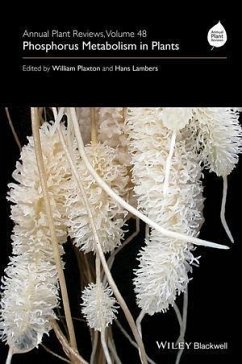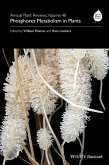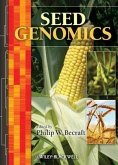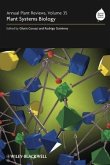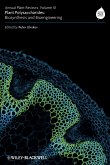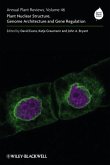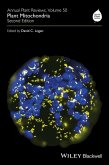Annual Plant Reviews, Volume 48, Phosphorus Metabolism in Plants (eBook, PDF)
Redaktion: Plaxton, William; Lambers, Hans


Alle Infos zum eBook verschenken

Annual Plant Reviews, Volume 48, Phosphorus Metabolism in Plants (eBook, PDF)
Redaktion: Plaxton, William; Lambers, Hans
- Format: PDF
- Merkliste
- Auf die Merkliste
- Bewerten Bewerten
- Teilen
- Produkt teilen
- Produkterinnerung
- Produkterinnerung

Hier können Sie sich einloggen

Bitte loggen Sie sich zunächst in Ihr Kundenkonto ein oder registrieren Sie sich bei bücher.de, um das eBook-Abo tolino select nutzen zu können.
The development of phosphorus (P)-efficient crop varieties is urgently needed to reduce agriculture's current over-reliance on expensive, environmentally destructive, non-renewable and inefficient P-containing fertilizers. The sustainable management of P in agriculture necessitates an exploitation of P-adaptive traits that will enhance the P-acquisition and P-use efficiency of crop plants. Action in this area is crucial to ensure sufficient food production for the world's ever-expanding population, and the overall economic success of agriculture in the 21st century. This informative and…mehr
- Geräte: PC
- mit Kopierschutz
- eBook Hilfe
- Größe: 22.15MB
![Annual Plant Reviews, Volume 48, Phosphorus Metabolism in Plants (eBook, ePUB) Annual Plant Reviews, Volume 48, Phosphorus Metabolism in Plants (eBook, ePUB)]() Annual Plant Reviews, Volume 48, Phosphorus Metabolism in Plants (eBook, ePUB)174,99 €
Annual Plant Reviews, Volume 48, Phosphorus Metabolism in Plants (eBook, ePUB)174,99 €![Seed Genomics (eBook, PDF) Seed Genomics (eBook, PDF)]() Philip W. BecraftSeed Genomics (eBook, PDF)187,99 €
Philip W. BecraftSeed Genomics (eBook, PDF)187,99 €![Annual Plant Reviews, Volume 35, Plant Systems Biology (eBook, PDF) Annual Plant Reviews, Volume 35, Plant Systems Biology (eBook, PDF)]() Annual Plant Reviews, Volume 35, Plant Systems Biology (eBook, PDF)195,99 €
Annual Plant Reviews, Volume 35, Plant Systems Biology (eBook, PDF)195,99 €![Annual Plant Reviews, Volume 41, Plant Polysaccharides (eBook, PDF) Annual Plant Reviews, Volume 41, Plant Polysaccharides (eBook, PDF)]() Annual Plant Reviews, Volume 41, Plant Polysaccharides (eBook, PDF)198,99 €
Annual Plant Reviews, Volume 41, Plant Polysaccharides (eBook, PDF)198,99 €![Annual Plant Reviews, Volume 46, Plant Nuclear Structure, Genome Architecture and Gene Regulation (eBook, PDF) Annual Plant Reviews, Volume 46, Plant Nuclear Structure, Genome Architecture and Gene Regulation (eBook, PDF)]() Annual Plant Reviews, Volume 46, Plant Nuclear Structure, Genome Architecture and Gene Regulation (eBook, PDF)140,99 €
Annual Plant Reviews, Volume 46, Plant Nuclear Structure, Genome Architecture and Gene Regulation (eBook, PDF)140,99 €![Annual Plant Reviews, Volume 42, Nitrogen Metabolism in Plants in the Post-genomic Era (eBook, PDF) Annual Plant Reviews, Volume 42, Nitrogen Metabolism in Plants in the Post-genomic Era (eBook, PDF)]() Annual Plant Reviews, Volume 42, Nitrogen Metabolism in Plants in the Post-genomic Era (eBook, PDF)172,99 €
Annual Plant Reviews, Volume 42, Nitrogen Metabolism in Plants in the Post-genomic Era (eBook, PDF)172,99 €![Annual Plant Reviews, Volume 50, Plant Mitochondria (eBook, PDF) Annual Plant Reviews, Volume 50, Plant Mitochondria (eBook, PDF)]() Annual Plant Reviews, Volume 50, Plant Mitochondria (eBook, PDF)179,99 €
Annual Plant Reviews, Volume 50, Plant Mitochondria (eBook, PDF)179,99 €-
-
-
Dieser Download kann aus rechtlichen Gründen nur mit Rechnungsadresse in A, B, BG, CY, CZ, D, DK, EW, E, FIN, F, GR, HR, H, IRL, I, LT, L, LR, M, NL, PL, P, R, S, SLO, SK ausgeliefert werden.
- Produktdetails
- Verlag: John Wiley & Sons
- Seitenzahl: 480
- Erscheinungstermin: 20. März 2015
- Englisch
- ISBN-13: 9781118958834
- Artikelnr.: 42676090
- Verlag: John Wiley & Sons
- Seitenzahl: 480
- Erscheinungstermin: 20. März 2015
- Englisch
- ISBN-13: 9781118958834
- Artikelnr.: 42676090
- Herstellerkennzeichnung Die Herstellerinformationen sind derzeit nicht verfügbar.
Preface xxiii
Section I Introduction
1 Phosphorus: Back to the Roots 3
Hans Lambers and William C. Plaxton
1.1 Introduction 3
1.2 Phosphorus or phosphorous? 4
1.3 Phosphorus on a geological time scale 6
1.4 Phosphorus as an essential, but frequently limiting, soil nutrient for
plant productivity 7
1.5 Soil phosphorus pools 9
1.6 Soil phosphorus mobility 10
1.7 Factors determining rates of phosphorus uptake by roots 11
1.8 Phosphorus-starvation responses: does phosphorus homeostasis exist? 13
1.9 Concluding remarks 14
Acknowledgements 15
References 15
Section II P-Sensing, Transport, and Metabolism
2 Sensing, Signalling, and Control of Phosphate Starvation in Plants:
Molecular Players and Applications 25
Wolf-Rüdiger Scheible and Monica Rojas-Triana
2.1 Introduction 25
2.2 The plant phosphate-starvation response 26
2.3 Sensing of phosphate and other macronutrient limitations in plants 29
2.3.1 Nutrient transporters as sensors/receptors 29
2.3.2 Local Pi sensing and signalling at the root tip by PDR2/LPR1 31
2.3.3 Phosphite, a tool to investigate P-sensing/signalling 31
2.4 Signalling of phosphate limitation 32
2.4.1 The role of phytohormones 33
2.4.2 Systemic signalling during P-starvation 37
2.4.3 Transcriptional regulators involved in P-signalling and affecting
P-starvation responses 39
2.4.4 The role of microRNAs and targeted protein degradation in
P-signalling 41
2.4.5 Additional regulators of P-signalling 43
2.5 Improving plant P-acquisition and -utilization efficiency: approaches
and targets 44
2.6 Concluding remarks 48
References 49
3 'Omics' Approaches Towards Understanding Plant Phosphorus Acquisition and
Use 65
Ping Lan, Wenfeng Li and Wolfgang Schmidt
3.1 Introduction 66
3.2 Towards a transcriptomics-derived 'phosphatome' 67
3.3 Pi deficiency-induced alterations in the proteome 77
3.4 Core PSR proteins 80
3.5 Membrane lipid remodelling: insights from the transcriptome, the
proteome, and the lipidome 83
3.6 Genome-wide histone modifications in Pi-deficient plants 86
3.7 Conclusions and outlook 89
3.8 Acknowledgements 90
References 90
4 The Role of Post-Translational Enzyme Modifications in the Metabolic
Adaptations of Phosphorus-Deprived Plants 99
William C. Plaxton and Michael W. Shane
4.1 Introduction 100
4.2 In the beginning there was protein phosphorylation 101
4.3 Monoubiquitination has emerged as a crucial PTM that interacts with
phosphorylation to control the function of diverse proteins 104
4.4 Post-translational modification of plant phosphoenolpyruvate
carboxylase by phosphorylation versus
monoubiquitination 107
4.4.1 Activation of PEP carboxylase by in-vivo phosphorylation appears to
be a universal aspect of
the plant P-starvation response 107
4.4.2 PEP carboxylase monoubiquitination: an old dog learns new tricks 109
4.4.3 Reciprocal control of PEP carboxylase by in-vivo monoubiquitination
and phosphorylation in
developing proteoid roots of P-deficient harsh hakea 111
4.5 Glycosylation is a sweet PTM of glycoproteins 114
4.5.1 A pair of AtPAP26 glycoforms is upregulated and secreted by
P-deprived Arabidopsis 115
4.5.2 The AtPAP26-S2 glycoform copurifies with, and appears to interact
with, a curculin-like lectin 116
4.6 Concluding remarks 117
Acknowledgements 118
References 119
5 Phosphate Transporters 125
Yves Poirier and Ji-Yul Jung
5.1 Introduction 125
5.2 The PHT1 transporters 126
5.2.1 PHT1 structure, activity, and expression patterns 126
5.3 Control of PHT1 activity 130
5.3.1 Control of PHT1 transcript levels 130
5.3.2 Post-transcriptional control of PHT1 133
5.4 PHO1 and phosphate export 136
5.4.1 PHO1 structure, activity, and expression patterns 136
5.4.2 Transcriptional control of PHO1 expression 139
5.4.3 Post-transcriptional control of PHO1 139
5.5 Phosphate transporters of organelles 140
5.5.1 Mitochondrial phosphate transporters 140
5.5.2 Plastidial phosphate transporters 141
5.5.3 The role of PHT2 in plastid phosphate transport 143
5.5.4 The role of PHT4 in plastid phosphate transport 143
5.6 Phosphate transporters of other organelles 145
5.6.1 Golgi phosphate transporters 145
5.6.2 Peroxisomal phosphate transporters 146
5.6.3 Vacuolar (tonoplast) phosphate transporters 146
5.7 Concluding remarks 146
Acknowledgements 147
References 147
6 Molecular Components that Drive Phosphorus-Remobilisation During Leaf
Senescence 159
Aaron P. Smith, Elena B. Fontenot, Sara Zahraeifard and Sandra Feuer DiTusa
6.1 Introduction 159
6.2 Transcriptomes of senescence and phosphate-deficiency 160
6.3 Major biochemical components that mediate P-remobilisation during leaf
senescence 162
6.3.1 Nucleases 163
6.3.2 Phosphatases 166
6.3.3 Lipid-remodelling enzymes 168
6.3.4 Pi transporters 169
6.4 Regulatory and signalling components of senescing leaves 170
6.4.1 Transcription factors 170
6.4.2 The SPX superfamily 173
6.4.3 Ubiquitination components and miRNAs 174
6.5 Role of hormones during leaf senescence 175
6.5.1 Ethylene and strigolactones 175
6.5.2 Abscisic acid 176
6.5.3 Cytokinins 176
6.6 Concluding remarks 176
Acknowledgements 177
References 177
7 Interactions Between Nitrogen and Phosphorus Metabolism 187
John A. Raven
7.1 Introduction 188
7.2 Roles of N and P in plants and the extent to which compounds containing
N or P can be substituted by compounds lacking N or P 188
7.3 Variability in the N:P ratio in plants and its metabolic and ecological
significance 195
7.3.1 Fixed N:P ratios: the role of compounds containing both N and P 195
7.3.2 Protein:RNA ratio, organism N:P ratio, the Growth Rate Hypothesis 197
7.3.3 Organism N and P concentration as a function of external supply of N
and P 200
7.3.4 Conclusions 201
7.4 Interactions in N and P acquisition and assimilation 201
7.4.1 Structures involved in acquisition of N and P 202
7.4.2 Secretion of enzymes and organic anions facilitates root N and P
acquisition 204
7.5 Protein synthesis and protein degradation during P-deprivation:
significance for N-P interaction 207
7.6 General conclusions 207
Acknowledgements 208
References 208
Section III P-deprivation Responses
8 Metabolomics of Plant Phosphorus-Starvation Response 217
Chris Jones, Jean-Hugues Hatier, Mingshu Cao, Karl Fraser and Susanne
Rasmussen
8.1 Introduction 218
8.2 Metabolomic approaches 219
8.3 Metabolomic analysis platforms 220
8.4 Data analysis 222
8.5 Metabolomics strategies directed at dissecting responses to P
starvation 223
8.6 Opportunities for metabolomics to contribute to the development of
P-efficient crops 229
8.7 Future prospects 230
Acknowledgements 231
References 231
9 Membrane Remodelling in Phosphorus-Deficient Plants 237
Meike Siebers, Peter Dörmann and Georg Hölzl
9.1 Introduction 237
9.2 Membrane lipid remodelling during phosphate deprivation 238
9.3 Monogalactosyldiacylglycerol (MGDG) 242
9.4 Digalactosyldiacylglycerol (DGDG) 243
9.5 Sulfolipid (SQDG) and glucuronosyldiacylglycerol (GlcADG) 247
9.6 Phospholipid degradation by phospholipase D and phosphatidate
phosphatase 248
9.7 Phospholipase C (PLC) 249
9.8 Acyl hydrolases 250
9.9 Lipid trafficking under phosphate starvation 250
9.10 Glucosylceramide, sterol glucoside, and acylated sterol glucoside 253
9.11 The role of auxin in remodelling of membrane lipid composition 254
9.12 Improved Pi status by symbiosis with arbuscular mycorrhizal fungi 255
9.13 Outlook 255
References 256
10 The Role of Intracellular and Secreted Purple Acid Phosphatases in Plant
Phosphorus Scavenging and Recycling 265
Jiang Tian and Hong Liao
10.1 Introduction 266
10.2 Bioinformatics and structural analysis of plant PAPs 266
10.2.1 PAP bioinformatics 266
10.2.2 Structural biochemistry of plant PAPs 269
10.3 Biochemical characterisation of plant PAPs 269
10.4 Diverse subcellular localisation of plant PAPs 271
10.5 Transcriptional and post-transcriptional regulation of PAP expression
by P availability 275
10.5.1 Complex signal transduction pathways integrate nutritional P status
with PAP expression 276
10.5.2 Post-translational PAP modification 277
10.6 Functional analysis of PAPs involved in P mobilization and utilisation
278
10.7 Perspectives 281
Acknowledgements 282
References 282
11 Metabolic Adaptations of the Non-Mycotrophic Proteaceae to Soils With
Low Phosphorus Availability 289
Hans Lambers, Peta L. Clode, Heidi-Jayne Hawkins, Etienne Laliberté, Rafael
S. Oliveira, Paul Reddell, Michael W. Shane, Mark Stitt and Peter Weston
11.1 Introduction 290
11.2 Phosphorus nutrition of Proteaceae, with a focus on south-western
Australia 291
11.2.1 Phosphorus acquisition by non-mycorrhizal roots: cluster roots 291
11.2.2 Proteaceae species that do not produce cluster roots 298
11.2.3 Phosphorus toxicity 299
11.2.4 High rates of photosynthesis despite low leaf P concentrations 300
11.2.5 Leaf longevity 307
11.2.6 Delayed greening 308
11.2.7 Efficient and proficient P remobilisation from senescing organs 310
11.2.8 Seed Preserves 311
11.3 Comparison of species of Proteaceae in south-western Australia with
species elsewhere 312
11.3.1 The Cape Floristic Region in South Africa 312
11.3.2 Eastern Australia 314
11.3.3 Southern South America 316
11.3.4 Brazil 317
11.4 Perspectives 318
Acknowledgements 323
References 323
12 Algae in a Phosphorus-Limited Landscape 337
Arthur R. Grossman and Munevver Aksoy
12.1 Introduction 338
12.2 P-deprivation responses of green algae and vascular plants 339
12.2.1 Phosphatases 342
12.2.2 Nucleases 346
12.2.3 Pi transport 348
12.2.4 Polyphosphates 350
12.2.5 Phospholipids 351
12.3 Control of P deprivation responses 353
12.3.1 PSR1-dependent gene expression in P-starved algae 356
12.3.2 Low-phosphate bleaching mutants 358
12.4 Future prospects 359
Acknowledgements 360
References 360
Section IV Significance of Plant-Microbe Interactions for P-Acquisition and
Metabolism
13 Impact of Roots, Microorganisms and Microfauna on the Fate of Soil
Phosphorus in the Rhizosphere 377
Philippe Hinsinger, Laetitia Herrmann, Didier Lesueur, Agnès Robin, Jean
Trap, Kittima Waithaisong and Claude Plassard
13.1 Introduction 378
13.2 Spatial extension of the rhizosphere 378
13.2.1 Root architecture and growth 379
13.2.2 Root hairs and mycorrhizas 380
13.2.3 Root growth-promoting effect of rhizosphere biota 381
13.3 Mobilisation of inorganic P in the rhizosphere 385
13.3.1 Effect of rhizosphere pH changes 385
13.3.2 Effect of exudation of carboxylates 387
13.4 Mobilisation of organic P in the rhizosphere 389
13.4.1 Effects of phosphatases 390
13.4.2 Effects of phytases 391
13.5 Microbial P, microbial loop, and P recycling in the rhizosphere 393
13.5.1 Abiotic processes 393
13.5.2 Biotic processes 394
13.6 Conclusions and future prospects 397
References 398
14 Mycorrhizal Associations and Phosphorus Acquisition: From Cells to
Ecosystems 409
Sally E. Smith, Ian C. Anderson and F. Andrew Smith
14.1 Introduction 410
14.2 Arbuscular mycorrhizas 413
14.2.1 Establishment of the symbiosis 413
14.2.2 Specialised AM interfaces in soil and roots are critical for P
uptake 413
14.2.3 The AM pathway in plant P nutrition 416
14.2.4 The 'mutualism-parasitism' continuum 417
14.2.5 Some higher-scale issues in AM symbiosis 418
14.2.6 Significance of AM symbioses in agriculture and horticulture 419
14.3 Ectomycorrhizas 421
14.3.1 Establishment of the symbiosis 421
14.3.2 Roles of ectomycorrhizas in plant P nutrition 422
14.3.3 ECM phosphate transporters 423
14.3.4 Solubilisation of inorganic phosphates by ECM fungi 425
14.3.5 Mobilisation of organic-P sources by ECM fungi 426
14.3.6 ECM symbioses and forest tree P nutrition: future challenges 428
14.4 Conclusions 429
References 430
Index 441
Preface xxiii
Section I Introduction
1 Phosphorus: Back to the Roots 3
Hans Lambers and William C. Plaxton
1.1 Introduction 3
1.2 Phosphorus or phosphorous? 4
1.3 Phosphorus on a geological time scale 6
1.4 Phosphorus as an essential, but frequently limiting, soil nutrient for
plant productivity 7
1.5 Soil phosphorus pools 9
1.6 Soil phosphorus mobility 10
1.7 Factors determining rates of phosphorus uptake by roots 11
1.8 Phosphorus-starvation responses: does phosphorus homeostasis exist? 13
1.9 Concluding remarks 14
Acknowledgements 15
References 15
Section II P-Sensing, Transport, and Metabolism
2 Sensing, Signalling, and Control of Phosphate Starvation in Plants:
Molecular Players and Applications 25
Wolf-Rüdiger Scheible and Monica Rojas-Triana
2.1 Introduction 25
2.2 The plant phosphate-starvation response 26
2.3 Sensing of phosphate and other macronutrient limitations in plants 29
2.3.1 Nutrient transporters as sensors/receptors 29
2.3.2 Local Pi sensing and signalling at the root tip by PDR2/LPR1 31
2.3.3 Phosphite, a tool to investigate P-sensing/signalling 31
2.4 Signalling of phosphate limitation 32
2.4.1 The role of phytohormones 33
2.4.2 Systemic signalling during P-starvation 37
2.4.3 Transcriptional regulators involved in P-signalling and affecting
P-starvation responses 39
2.4.4 The role of microRNAs and targeted protein degradation in
P-signalling 41
2.4.5 Additional regulators of P-signalling 43
2.5 Improving plant P-acquisition and -utilization efficiency: approaches
and targets 44
2.6 Concluding remarks 48
References 49
3 'Omics' Approaches Towards Understanding Plant Phosphorus Acquisition and
Use 65
Ping Lan, Wenfeng Li and Wolfgang Schmidt
3.1 Introduction 66
3.2 Towards a transcriptomics-derived 'phosphatome' 67
3.3 Pi deficiency-induced alterations in the proteome 77
3.4 Core PSR proteins 80
3.5 Membrane lipid remodelling: insights from the transcriptome, the
proteome, and the lipidome 83
3.6 Genome-wide histone modifications in Pi-deficient plants 86
3.7 Conclusions and outlook 89
3.8 Acknowledgements 90
References 90
4 The Role of Post-Translational Enzyme Modifications in the Metabolic
Adaptations of Phosphorus-Deprived Plants 99
William C. Plaxton and Michael W. Shane
4.1 Introduction 100
4.2 In the beginning there was protein phosphorylation 101
4.3 Monoubiquitination has emerged as a crucial PTM that interacts with
phosphorylation to control the function of diverse proteins 104
4.4 Post-translational modification of plant phosphoenolpyruvate
carboxylase by phosphorylation versus
monoubiquitination 107
4.4.1 Activation of PEP carboxylase by in-vivo phosphorylation appears to
be a universal aspect of
the plant P-starvation response 107
4.4.2 PEP carboxylase monoubiquitination: an old dog learns new tricks 109
4.4.3 Reciprocal control of PEP carboxylase by in-vivo monoubiquitination
and phosphorylation in
developing proteoid roots of P-deficient harsh hakea 111
4.5 Glycosylation is a sweet PTM of glycoproteins 114
4.5.1 A pair of AtPAP26 glycoforms is upregulated and secreted by
P-deprived Arabidopsis 115
4.5.2 The AtPAP26-S2 glycoform copurifies with, and appears to interact
with, a curculin-like lectin 116
4.6 Concluding remarks 117
Acknowledgements 118
References 119
5 Phosphate Transporters 125
Yves Poirier and Ji-Yul Jung
5.1 Introduction 125
5.2 The PHT1 transporters 126
5.2.1 PHT1 structure, activity, and expression patterns 126
5.3 Control of PHT1 activity 130
5.3.1 Control of PHT1 transcript levels 130
5.3.2 Post-transcriptional control of PHT1 133
5.4 PHO1 and phosphate export 136
5.4.1 PHO1 structure, activity, and expression patterns 136
5.4.2 Transcriptional control of PHO1 expression 139
5.4.3 Post-transcriptional control of PHO1 139
5.5 Phosphate transporters of organelles 140
5.5.1 Mitochondrial phosphate transporters 140
5.5.2 Plastidial phosphate transporters 141
5.5.3 The role of PHT2 in plastid phosphate transport 143
5.5.4 The role of PHT4 in plastid phosphate transport 143
5.6 Phosphate transporters of other organelles 145
5.6.1 Golgi phosphate transporters 145
5.6.2 Peroxisomal phosphate transporters 146
5.6.3 Vacuolar (tonoplast) phosphate transporters 146
5.7 Concluding remarks 146
Acknowledgements 147
References 147
6 Molecular Components that Drive Phosphorus-Remobilisation During Leaf
Senescence 159
Aaron P. Smith, Elena B. Fontenot, Sara Zahraeifard and Sandra Feuer DiTusa
6.1 Introduction 159
6.2 Transcriptomes of senescence and phosphate-deficiency 160
6.3 Major biochemical components that mediate P-remobilisation during leaf
senescence 162
6.3.1 Nucleases 163
6.3.2 Phosphatases 166
6.3.3 Lipid-remodelling enzymes 168
6.3.4 Pi transporters 169
6.4 Regulatory and signalling components of senescing leaves 170
6.4.1 Transcription factors 170
6.4.2 The SPX superfamily 173
6.4.3 Ubiquitination components and miRNAs 174
6.5 Role of hormones during leaf senescence 175
6.5.1 Ethylene and strigolactones 175
6.5.2 Abscisic acid 176
6.5.3 Cytokinins 176
6.6 Concluding remarks 176
Acknowledgements 177
References 177
7 Interactions Between Nitrogen and Phosphorus Metabolism 187
John A. Raven
7.1 Introduction 188
7.2 Roles of N and P in plants and the extent to which compounds containing
N or P can be substituted by compounds lacking N or P 188
7.3 Variability in the N:P ratio in plants and its metabolic and ecological
significance 195
7.3.1 Fixed N:P ratios: the role of compounds containing both N and P 195
7.3.2 Protein:RNA ratio, organism N:P ratio, the Growth Rate Hypothesis 197
7.3.3 Organism N and P concentration as a function of external supply of N
and P 200
7.3.4 Conclusions 201
7.4 Interactions in N and P acquisition and assimilation 201
7.4.1 Structures involved in acquisition of N and P 202
7.4.2 Secretion of enzymes and organic anions facilitates root N and P
acquisition 204
7.5 Protein synthesis and protein degradation during P-deprivation:
significance for N-P interaction 207
7.6 General conclusions 207
Acknowledgements 208
References 208
Section III P-deprivation Responses
8 Metabolomics of Plant Phosphorus-Starvation Response 217
Chris Jones, Jean-Hugues Hatier, Mingshu Cao, Karl Fraser and Susanne
Rasmussen
8.1 Introduction 218
8.2 Metabolomic approaches 219
8.3 Metabolomic analysis platforms 220
8.4 Data analysis 222
8.5 Metabolomics strategies directed at dissecting responses to P
starvation 223
8.6 Opportunities for metabolomics to contribute to the development of
P-efficient crops 229
8.7 Future prospects 230
Acknowledgements 231
References 231
9 Membrane Remodelling in Phosphorus-Deficient Plants 237
Meike Siebers, Peter Dörmann and Georg Hölzl
9.1 Introduction 237
9.2 Membrane lipid remodelling during phosphate deprivation 238
9.3 Monogalactosyldiacylglycerol (MGDG) 242
9.4 Digalactosyldiacylglycerol (DGDG) 243
9.5 Sulfolipid (SQDG) and glucuronosyldiacylglycerol (GlcADG) 247
9.6 Phospholipid degradation by phospholipase D and phosphatidate
phosphatase 248
9.7 Phospholipase C (PLC) 249
9.8 Acyl hydrolases 250
9.9 Lipid trafficking under phosphate starvation 250
9.10 Glucosylceramide, sterol glucoside, and acylated sterol glucoside 253
9.11 The role of auxin in remodelling of membrane lipid composition 254
9.12 Improved Pi status by symbiosis with arbuscular mycorrhizal fungi 255
9.13 Outlook 255
References 256
10 The Role of Intracellular and Secreted Purple Acid Phosphatases in Plant
Phosphorus Scavenging and Recycling 265
Jiang Tian and Hong Liao
10.1 Introduction 266
10.2 Bioinformatics and structural analysis of plant PAPs 266
10.2.1 PAP bioinformatics 266
10.2.2 Structural biochemistry of plant PAPs 269
10.3 Biochemical characterisation of plant PAPs 269
10.4 Diverse subcellular localisation of plant PAPs 271
10.5 Transcriptional and post-transcriptional regulation of PAP expression
by P availability 275
10.5.1 Complex signal transduction pathways integrate nutritional P status
with PAP expression 276
10.5.2 Post-translational PAP modification 277
10.6 Functional analysis of PAPs involved in P mobilization and utilisation
278
10.7 Perspectives 281
Acknowledgements 282
References 282
11 Metabolic Adaptations of the Non-Mycotrophic Proteaceae to Soils With
Low Phosphorus Availability 289
Hans Lambers, Peta L. Clode, Heidi-Jayne Hawkins, Etienne Laliberté, Rafael
S. Oliveira, Paul Reddell, Michael W. Shane, Mark Stitt and Peter Weston
11.1 Introduction 290
11.2 Phosphorus nutrition of Proteaceae, with a focus on south-western
Australia 291
11.2.1 Phosphorus acquisition by non-mycorrhizal roots: cluster roots 291
11.2.2 Proteaceae species that do not produce cluster roots 298
11.2.3 Phosphorus toxicity 299
11.2.4 High rates of photosynthesis despite low leaf P concentrations 300
11.2.5 Leaf longevity 307
11.2.6 Delayed greening 308
11.2.7 Efficient and proficient P remobilisation from senescing organs 310
11.2.8 Seed Preserves 311
11.3 Comparison of species of Proteaceae in south-western Australia with
species elsewhere 312
11.3.1 The Cape Floristic Region in South Africa 312
11.3.2 Eastern Australia 314
11.3.3 Southern South America 316
11.3.4 Brazil 317
11.4 Perspectives 318
Acknowledgements 323
References 323
12 Algae in a Phosphorus-Limited Landscape 337
Arthur R. Grossman and Munevver Aksoy
12.1 Introduction 338
12.2 P-deprivation responses of green algae and vascular plants 339
12.2.1 Phosphatases 342
12.2.2 Nucleases 346
12.2.3 Pi transport 348
12.2.4 Polyphosphates 350
12.2.5 Phospholipids 351
12.3 Control of P deprivation responses 353
12.3.1 PSR1-dependent gene expression in P-starved algae 356
12.3.2 Low-phosphate bleaching mutants 358
12.4 Future prospects 359
Acknowledgements 360
References 360
Section IV Significance of Plant-Microbe Interactions for P-Acquisition and
Metabolism
13 Impact of Roots, Microorganisms and Microfauna on the Fate of Soil
Phosphorus in the Rhizosphere 377
Philippe Hinsinger, Laetitia Herrmann, Didier Lesueur, Agnès Robin, Jean
Trap, Kittima Waithaisong and Claude Plassard
13.1 Introduction 378
13.2 Spatial extension of the rhizosphere 378
13.2.1 Root architecture and growth 379
13.2.2 Root hairs and mycorrhizas 380
13.2.3 Root growth-promoting effect of rhizosphere biota 381
13.3 Mobilisation of inorganic P in the rhizosphere 385
13.3.1 Effect of rhizosphere pH changes 385
13.3.2 Effect of exudation of carboxylates 387
13.4 Mobilisation of organic P in the rhizosphere 389
13.4.1 Effects of phosphatases 390
13.4.2 Effects of phytases 391
13.5 Microbial P, microbial loop, and P recycling in the rhizosphere 393
13.5.1 Abiotic processes 393
13.5.2 Biotic processes 394
13.6 Conclusions and future prospects 397
References 398
14 Mycorrhizal Associations and Phosphorus Acquisition: From Cells to
Ecosystems 409
Sally E. Smith, Ian C. Anderson and F. Andrew Smith
14.1 Introduction 410
14.2 Arbuscular mycorrhizas 413
14.2.1 Establishment of the symbiosis 413
14.2.2 Specialised AM interfaces in soil and roots are critical for P
uptake 413
14.2.3 The AM pathway in plant P nutrition 416
14.2.4 The 'mutualism-parasitism' continuum 417
14.2.5 Some higher-scale issues in AM symbiosis 418
14.2.6 Significance of AM symbioses in agriculture and horticulture 419
14.3 Ectomycorrhizas 421
14.3.1 Establishment of the symbiosis 421
14.3.2 Roles of ectomycorrhizas in plant P nutrition 422
14.3.3 ECM phosphate transporters 423
14.3.4 Solubilisation of inorganic phosphates by ECM fungi 425
14.3.5 Mobilisation of organic-P sources by ECM fungi 426
14.3.6 ECM symbioses and forest tree P nutrition: future challenges 428
14.4 Conclusions 429
References 430
Index 441
